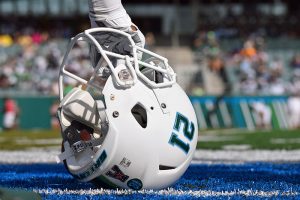Charlotte Personal Injury Attorney Matt Arnold answers the question: “What can you sue for in a personal injury case?”
Six lawsuits were just filed by former college football players against their universities, conferences, and the National Collegiate Athletic Association, claiming negligence over the handling of the players’ head injuries. The named defendants in the filings include Vanderbilt and Penn State and three major football conferences: the Southeastern Conference, the Big Ten, and the Pacific-12.
 Earlier this year, a federal judge approved a settlement in a separate class-action lawsuit on behalf of all college athletes against the N.C.A.A. The proposed settlement included new safety protocols but did not offer any payments to individual players struggling with cognitive brain function issues following football-related concussions.
Earlier this year, a federal judge approved a settlement in a separate class-action lawsuit on behalf of all college athletes against the N.C.A.A. The proposed settlement included new safety protocols but did not offer any payments to individual players struggling with cognitive brain function issues following football-related concussions.
In contrast, the N.F.L.’s settlement with retired players last year included hundreds of millions of dollars to help retired players with any of several neurological diseases. It provided for payments of up to $5 million to affected players, medical monitoring for all N.F.L. players to determine whether they qualify for payment, with an additional $10 million set aside for education about concussions.
The new N.C.A.A. lawsuits also name Auburn, Georgian, Utah and Oregon as defendant universities. The plaintiffs involved had careers spanning the decades before the N.C.A.A. started requiring concussion protocols from its members; one of the plaintiffs competed as far back as the 1970s. The lawsuits state that the players suffered concussions in college and now have a variety of health problems, including depression, mood swings and sleeplessness.
The new suits face hurdles. Concussed former college athletes first sued the N.C.A.A. over concussions in 2011. After numerous similar cases were brought around the country, they were consolidated into the class-action case.
In 2014, the N.C.A.A. announced that they had reached a settlement with the plaintiffs’ attorneys. The judge approved most of the terms, including a $70 million fund to screen for brain trauma, but notably refused to sign off on the provision that would have given the N.C.A.A. full immunity from class-action lawsuits in the future. The judge’s counter-proposal to the settlement agreement specifically allowed for athletes from one university to sue the organization as a class. As of now, the N.C.A.A. still has yet to agree to this proposal.
This back-and-forth well demonstrates the process of negotiating a settlement instead of going to trial—both defendant and plaintiff must find terms they agree on, and present them to the judge in a cohesive agreement. This agreement is presented to the judge, who can approve the agreement in whole or in part. If they see fit, the judge can make a recommendation as to any new or changed terms for the agreement, as happened here. Then, both parties must agree to these changes.
Each of the six cases filed seeks its own jury trial to award damages to the players individually. Some legal experts have pointed out that it might be much easier to prove negligence against the N.F.L., an organization dedicated specifically to professional football, than against universities, who have broader and more diverse goals.
Attorneys for the former football players have declined to speculate on the potential payout if they win. One of them, Chicago attorney Jay Edelson, said that they expect 40 to 50 class-action lawsuits to additionally be filed on behalf of tens of thousands of former football players.
If you or someone close to you has been injured, contact an experienced personal injury attorney today who can help you receive the compensation to which you may be entitled. Contact Arnold & Smith, PLLC for a free consultation, call at 704-370-2828 or click here for additional resources.
About the Author
 Matthew Arnold is a Managing Member of Arnold & Smith, PLLC, where he focuses on the areas of family law, divorce, child custody, child support, alimony and equitable distribution.
Matthew Arnold is a Managing Member of Arnold & Smith, PLLC, where he focuses on the areas of family law, divorce, child custody, child support, alimony and equitable distribution.
Mr. Arnold was raised in Charlotte, where he graduated from Providence Senior High School. He attended Belmont Abbey College, where he graduated cum laude, before attending law school at the University of North Carolina at Chapel Hill on a full academic scholarship.
A board-certified specialist in the practice of Family Law, Mr. Arnold is admitted to practice in all state courts in North Carolina, in the United States Federal Court for the Western District of North Carolina, in the North Carolina Court of Appeals and Supreme Court, and in the Fourth Circuit United States Court of Appeals in Richmond, Virginia.
In his free time, Mr. Arnold enjoys golfing and spending time with his wife and three children.
Source:
http://espn.go.com/college-sports/story/_/id/14653320/judge-oks-reworked-ncaa-concussion-settlement
Image Credit:
https://commons.wikimedia.org/wiki/File:Tulane_Green_Wave_football_helmet_(during_game).jpg
See Our Related Video from our YouTube channel:
https://www.youtube.com/user/ArnoldSmithPLLC/videos
See Our Related Blog Posts:
 Charlotte Injury Lawyers Blog
Charlotte Injury Lawyers Blog

